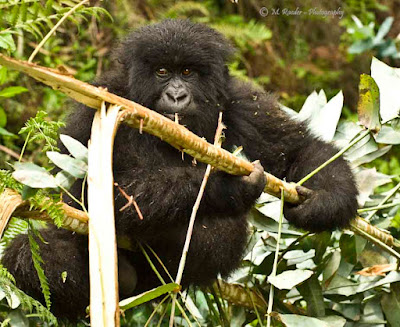Travel TidBits: Gorilla Galore!!
After my first gorilla trekking, I had 2 more wonderful encounters with 2 different families of gorillas. You might recall that gorillas live in family units headed by a mature silverback. The Kwitonga family with 21 gorillas including a 35-year old dominant silverback, 2 younger silverbacks, females and youngsters including a mother with a 5-day old baby (which we saw!!). The Agasha family is an equally large family with several mothers with small babies that they proudly carried on their back.
Each time, our trek was easier than the first time. The Kwitongas were about ½ hour from the park boundary. Since it was raining, we had much slip and slide as we crossed the muddy moat beyond the wall that marks the end of the agricultural land and the wild forest of the Vulcano Park. Bat all was forgotten when we reached the gorilla family and observed 2 young gorillas play: a 7-month old and a 4-year old. Since the rangers are visiting the gorillas every day of the year, they know each of them intimately. The youngsters were chasing each other like children around bamboo trunks and were tumbling and wrestling. In between, the younger one was coming close to us, circling and inspecting us. The rangers were shooing them away trying to teach them not to approach us too close since once they grow up, they are strong animals that we want to keep a safe distance from. It is amazing how close we were to the gorillas and yet, they in general were completely disinterested in us and were going about their daily business: feeding, slowly migrating through the forest and resting. Each evening they select another area to rest for the night when the females and youngsters make a leafy nest in the canopy and the dominant silverback rests on the forest floor, too heavy for the lofty leaf nests.
Silverback eating in the eucalyptus forest
Mother with baby on the back
Younger silverback
Gorilla baby
Young gorilla in eucalyptus tree
Ripping off eucalyptus bark
Gorilla (female) with another gorilla nearby
Gorilla
Unfortunately, we can only have these experiences and adventures in the National Parks and Reserves since the population pressure all over Africa and in other developing countries have basically eliminated wildlife from habitated areas. And the pressure to farm and agriculture more and more land will continue to squeeze available land for the wild. This is a sad fact. However, I am grateful that I had the opportunity to experience it and to capture it in my memory and in my photos. As I am writing this from my home in California, I am grateful for the time I had, for my wonderful guides in Kenya, in Tanzania and in Rwanda who made close viewing of the wildlife possible and who taught me so much about life in Africa. Thank you all!
Saying Good Bye!
________________________________________________________________________









